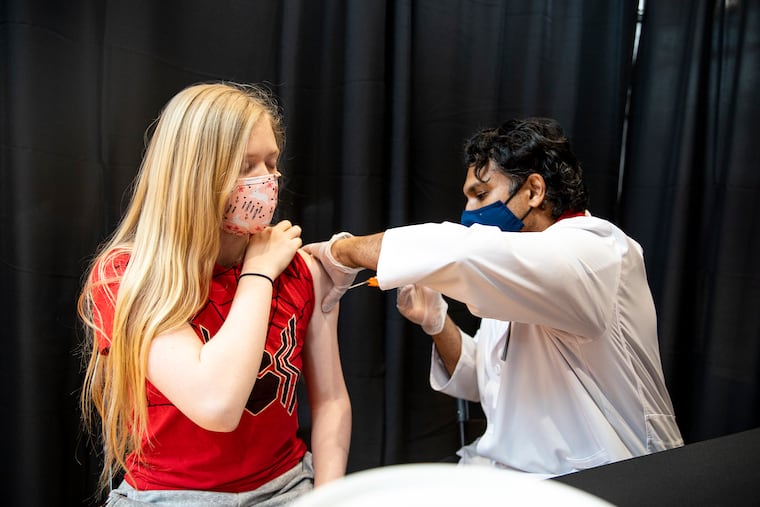COVID-19 survivors need vaccination, but one shot may be enough, studies from Penn and others show
Past infection doesn't mean protection. The latest findings make it clearer than ever that vaccination is vital to beating the pandemic.

A coronavirus infection generates weaker, shorter immune responses than vaccination, but people who recover from COVID-19 probably need only one dose of the authorized two-dose vaccines for full protection, a University of Pennsylvania study suggests.
What’s more, natural infection does not always prevent reinfection, not even for young, healthy adults, concludes a new study led by the U.S. Naval Medical Research Center and published in the Lancet.
Taken together, the latest findings make it clearer than ever that vaccination is vital to beating the pandemic.
“Despite a prior COVID-19 infection, young people can catch the virus again and may still transmit it to others,” senior author Stuart Sealfon, a neurobiologist at Mount Sinai Hospital’s Icahn School of Medicine, said in a statement. “Immunity is not guaranteed by past infection, and vaccinations are still needed for those who have had COVID-19.″
So far, public health officials at all levels have stressed that people who recover from COVID-19 should get both doses of the Moderna or Pfizer vaccines to ensure full protection. (Use of the single-shot Johnson & Johnson vaccine has been paused while regulators investigate a possible link to a very rare, life-threatening clotting reaction.)
But the Penn study, published this week in Science Immunology, suggests the second dose is unneeded for survivors. Study participants who had recovered from COVID-19 mounted a potent antibody response to the first mRNA vaccine dose, and saw nominal added benefit after the second dose.
Recent studies published in Science and in the New England Journal of Medicine found the same thing. The Penn analysis, however, is one of the first to measure signs of long-term immunity — the creation of memory B cells — as well as levels of antibodies, the initial line of defense.
Although the study was small, the results were striking. The team followed 44 volunteers, including 11 who had previously had COVID-19, through vaccination with Moderna or Pfizer shots. Blood samples were collected and analyzed before and after each vaccine dose, for a total of four samples per volunteer.
In the 11 volunteers with a past infection, a single vaccine dose was enough to induce a maximal response involving antibodies and memory B cells. The researchers speculate this is because infection primes the immune system much like a first shot.
In contrast, it took two vaccine doses to induce strong antibody and memory B cell responses in the 33 volunteers who did not previously have COVID-19.
The researchers also tested the volunteers’ antibodies against a coronavirus variant, first seen in South Africa, that is more transmissible and dangerous. Again, the COVID-19 survivors had plenty of antibodies against the variant after one vaccine dose, but the other volunteers needed two doses.
“This is important for us to keep in mind as we consider vaccination strategies in the future and potential viral variants,” said senior author E. John Wherry, director of the Perelman School of Medicine’s Institute of Immunology at Penn. “We need to make sure people have the strongest memory B cell responses available. If circulating antibodies wane over time, our data suggests that durable memory B cells could provide a rapid source of protection against re-exposure to COVID-19, including variants.”
The Naval study followed about 3,000 U.S. Marines, most of them men ages 18 to 20. Antibody tests showed that 189 of them had had a COVID-19 infection in the past.
After a six-week quarantine, all the Marines were followed for another six weeks. Among the 189 with a past infection, 19 of them tested positive for COVID-19 infection at least once, although they had few or no symptoms. That 10% reinfection rate — which is much higher than in other studies — reflects the crowded living conditions on a military base and the close contact of basic training, the researchers noted.
Whether the fast-evolving understanding of immunity to COVID-19 will prompt a change in U.S. vaccine guidance remains to be seen. Unlike many developing countries, the U.S. will soon have a surplus of Moderna and Pfizer vaccines, but the Biden administration is facing pressure to share with needier parts of the world.
A one-dose recommendation for previously infected people — which France’s health authority has already issued — would simplify and speed the U.S. immunization effort.
In a February blog post, Francis Collins, director of the National Institutes of Health, called it a “possibility.”
“While much more research is needed,” he wrote, “the results raise the possibility that one dose might be enough for someone who’s been infected with SARS-CoV-2 and already generated antibodies against the virus.”